Community Psychology Essay on Gender Discrimination
VerifiedAdded on 2023/01/18
|15
|3940
|52
Essay
AI Summary
This essay delves into the field of community psychology, examining its core principles and historical development. It explores the concept of social justice within this framework, highlighting the beliefs and assumptions that underpin it. The essay then focuses on gender discrimination, particularly female genital mutilation (FGM) in Ethiopia, as a critical example. It analyzes the psychological consequences of FGM, presents a case study, and discusses community psychology's potential to address this issue through interventions and empowerment strategies. The essay also explores community perceptions of gender bias, stereotypes, and the visions, values, and beliefs surrounding gender discrimination. Finally, it examines the impact of community psychology in addressing FGM and other forms of gender inequality, concluding with reflections on professional and ethical considerations, the current situation, and the need for intervention.
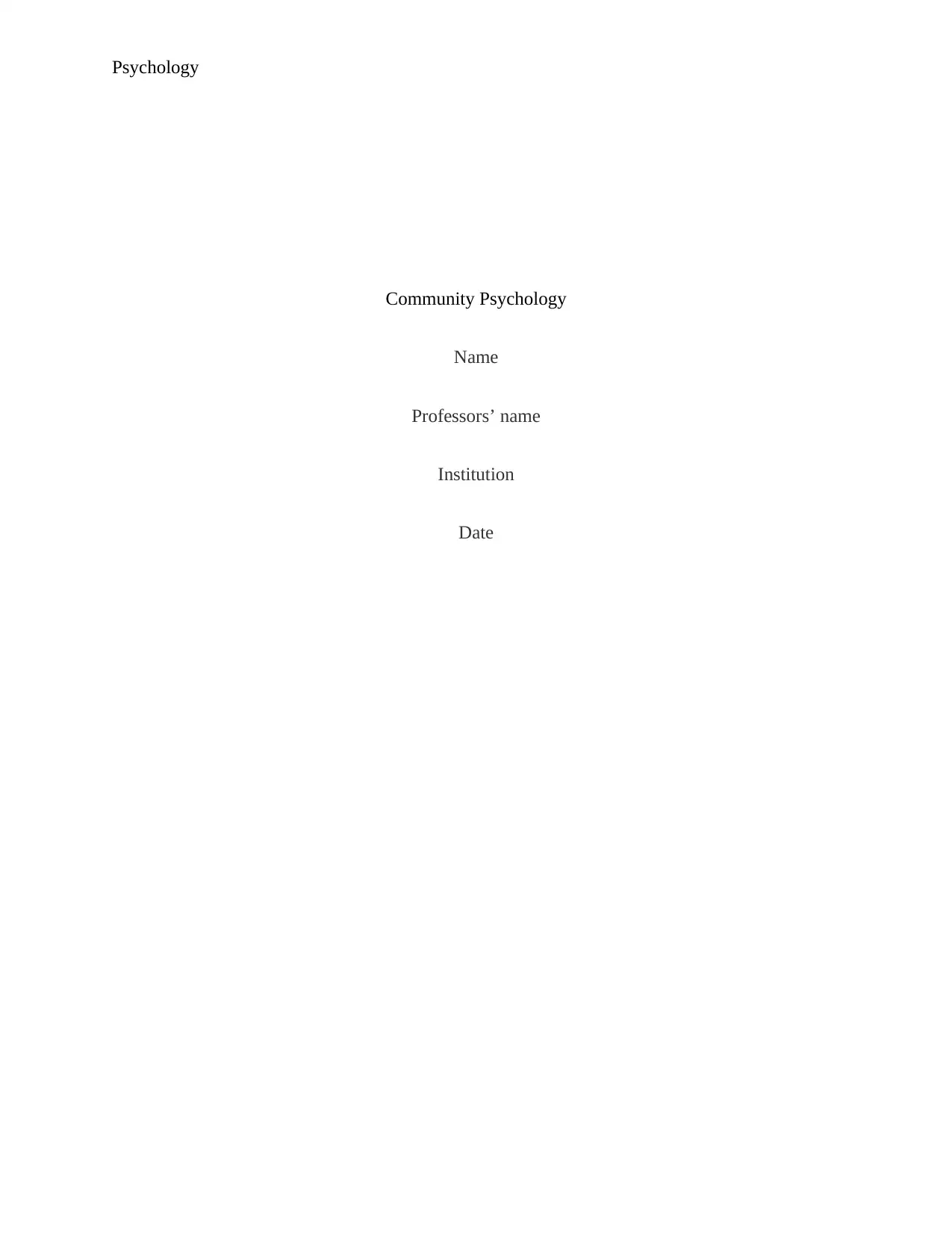
Psychology
Community Psychology
Name
Professors’ name
Institution
Date
Community Psychology
Name
Professors’ name
Institution
Date
Paraphrase This Document
Need a fresh take? Get an instant paraphrase of this document with our AI Paraphraser
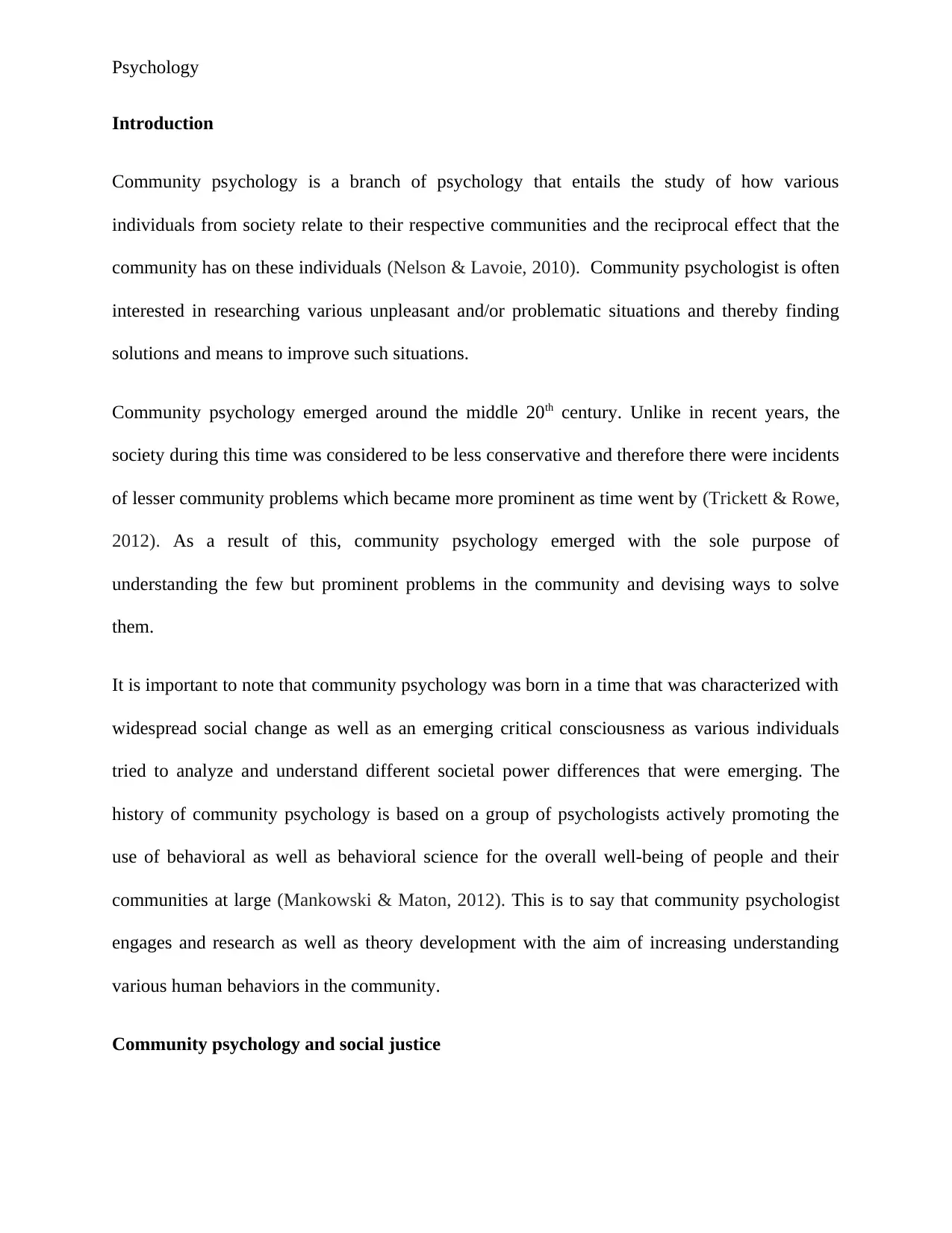
Psychology
Introduction
Community psychology is a branch of psychology that entails the study of how various
individuals from society relate to their respective communities and the reciprocal effect that the
community has on these individuals (Nelson & Lavoie, 2010). Community psychologist is often
interested in researching various unpleasant and/or problematic situations and thereby finding
solutions and means to improve such situations.
Community psychology emerged around the middle 20th century. Unlike in recent years, the
society during this time was considered to be less conservative and therefore there were incidents
of lesser community problems which became more prominent as time went by (Trickett & Rowe,
2012). As a result of this, community psychology emerged with the sole purpose of
understanding the few but prominent problems in the community and devising ways to solve
them.
It is important to note that community psychology was born in a time that was characterized with
widespread social change as well as an emerging critical consciousness as various individuals
tried to analyze and understand different societal power differences that were emerging. The
history of community psychology is based on a group of psychologists actively promoting the
use of behavioral as well as behavioral science for the overall well-being of people and their
communities at large (Mankowski & Maton, 2012). This is to say that community psychologist
engages and research as well as theory development with the aim of increasing understanding
various human behaviors in the community.
Community psychology and social justice
Introduction
Community psychology is a branch of psychology that entails the study of how various
individuals from society relate to their respective communities and the reciprocal effect that the
community has on these individuals (Nelson & Lavoie, 2010). Community psychologist is often
interested in researching various unpleasant and/or problematic situations and thereby finding
solutions and means to improve such situations.
Community psychology emerged around the middle 20th century. Unlike in recent years, the
society during this time was considered to be less conservative and therefore there were incidents
of lesser community problems which became more prominent as time went by (Trickett & Rowe,
2012). As a result of this, community psychology emerged with the sole purpose of
understanding the few but prominent problems in the community and devising ways to solve
them.
It is important to note that community psychology was born in a time that was characterized with
widespread social change as well as an emerging critical consciousness as various individuals
tried to analyze and understand different societal power differences that were emerging. The
history of community psychology is based on a group of psychologists actively promoting the
use of behavioral as well as behavioral science for the overall well-being of people and their
communities at large (Mankowski & Maton, 2012). This is to say that community psychologist
engages and research as well as theory development with the aim of increasing understanding
various human behaviors in the community.
Community psychology and social justice
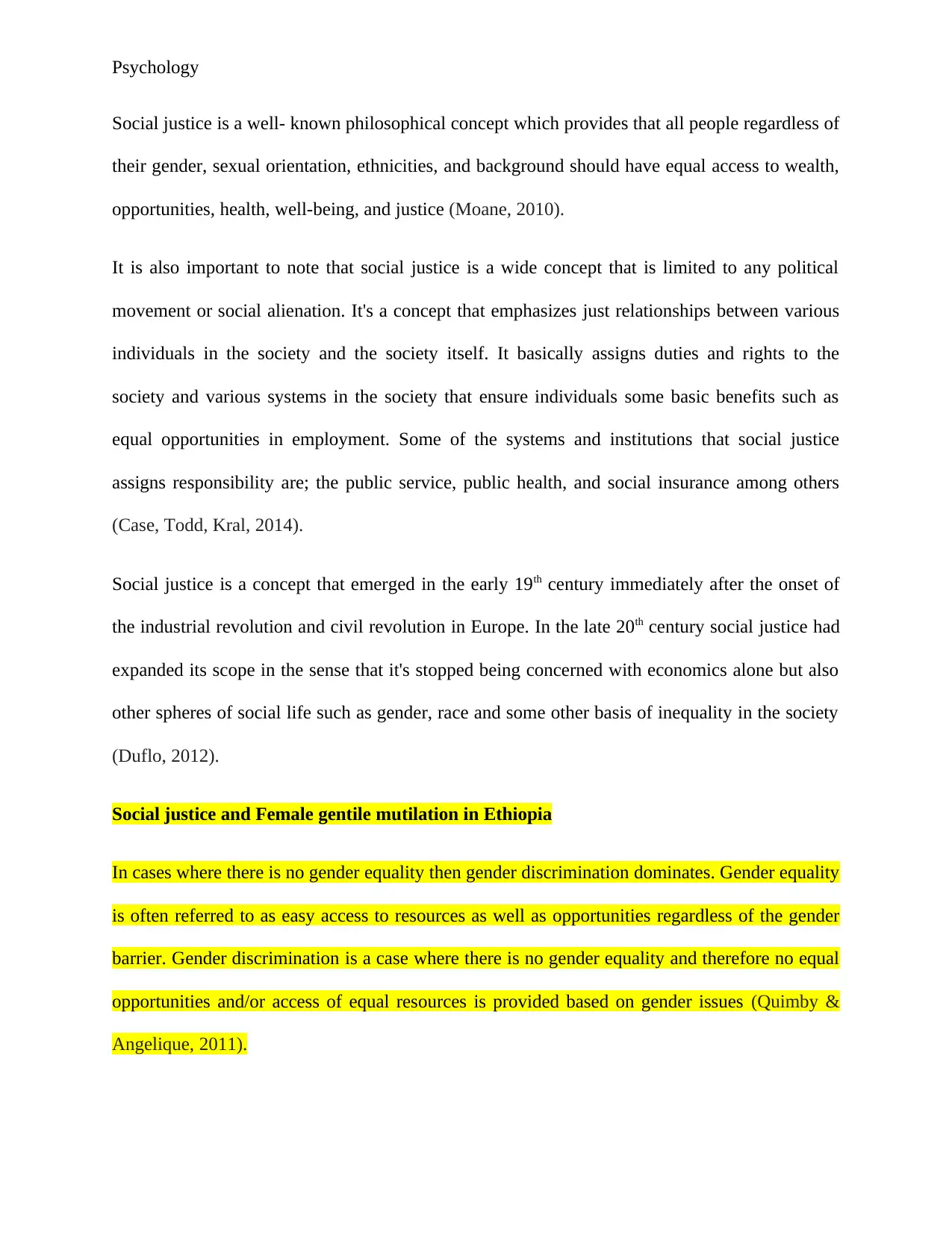
Psychology
Social justice is a well- known philosophical concept which provides that all people regardless of
their gender, sexual orientation, ethnicities, and background should have equal access to wealth,
opportunities, health, well-being, and justice (Moane, 2010).
It is also important to note that social justice is a wide concept that is limited to any political
movement or social alienation. It's a concept that emphasizes just relationships between various
individuals in the society and the society itself. It basically assigns duties and rights to the
society and various systems in the society that ensure individuals some basic benefits such as
equal opportunities in employment. Some of the systems and institutions that social justice
assigns responsibility are; the public service, public health, and social insurance among others
(Case, Todd, Kral, 2014).
Social justice is a concept that emerged in the early 19th century immediately after the onset of
the industrial revolution and civil revolution in Europe. In the late 20th century social justice had
expanded its scope in the sense that it's stopped being concerned with economics alone but also
other spheres of social life such as gender, race and some other basis of inequality in the society
(Duflo, 2012).
Social justice and Female gentile mutilation in Ethiopia
In cases where there is no gender equality then gender discrimination dominates. Gender equality
is often referred to as easy access to resources as well as opportunities regardless of the gender
barrier. Gender discrimination is a case where there is no gender equality and therefore no equal
opportunities and/or access of equal resources is provided based on gender issues (Quimby &
Angelique, 2011).
Social justice is a well- known philosophical concept which provides that all people regardless of
their gender, sexual orientation, ethnicities, and background should have equal access to wealth,
opportunities, health, well-being, and justice (Moane, 2010).
It is also important to note that social justice is a wide concept that is limited to any political
movement or social alienation. It's a concept that emphasizes just relationships between various
individuals in the society and the society itself. It basically assigns duties and rights to the
society and various systems in the society that ensure individuals some basic benefits such as
equal opportunities in employment. Some of the systems and institutions that social justice
assigns responsibility are; the public service, public health, and social insurance among others
(Case, Todd, Kral, 2014).
Social justice is a concept that emerged in the early 19th century immediately after the onset of
the industrial revolution and civil revolution in Europe. In the late 20th century social justice had
expanded its scope in the sense that it's stopped being concerned with economics alone but also
other spheres of social life such as gender, race and some other basis of inequality in the society
(Duflo, 2012).
Social justice and Female gentile mutilation in Ethiopia
In cases where there is no gender equality then gender discrimination dominates. Gender equality
is often referred to as easy access to resources as well as opportunities regardless of the gender
barrier. Gender discrimination is a case where there is no gender equality and therefore no equal
opportunities and/or access of equal resources is provided based on gender issues (Quimby &
Angelique, 2011).
⊘ This is a preview!⊘
Do you want full access?
Subscribe today to unlock all pages.

Trusted by 1+ million students worldwide
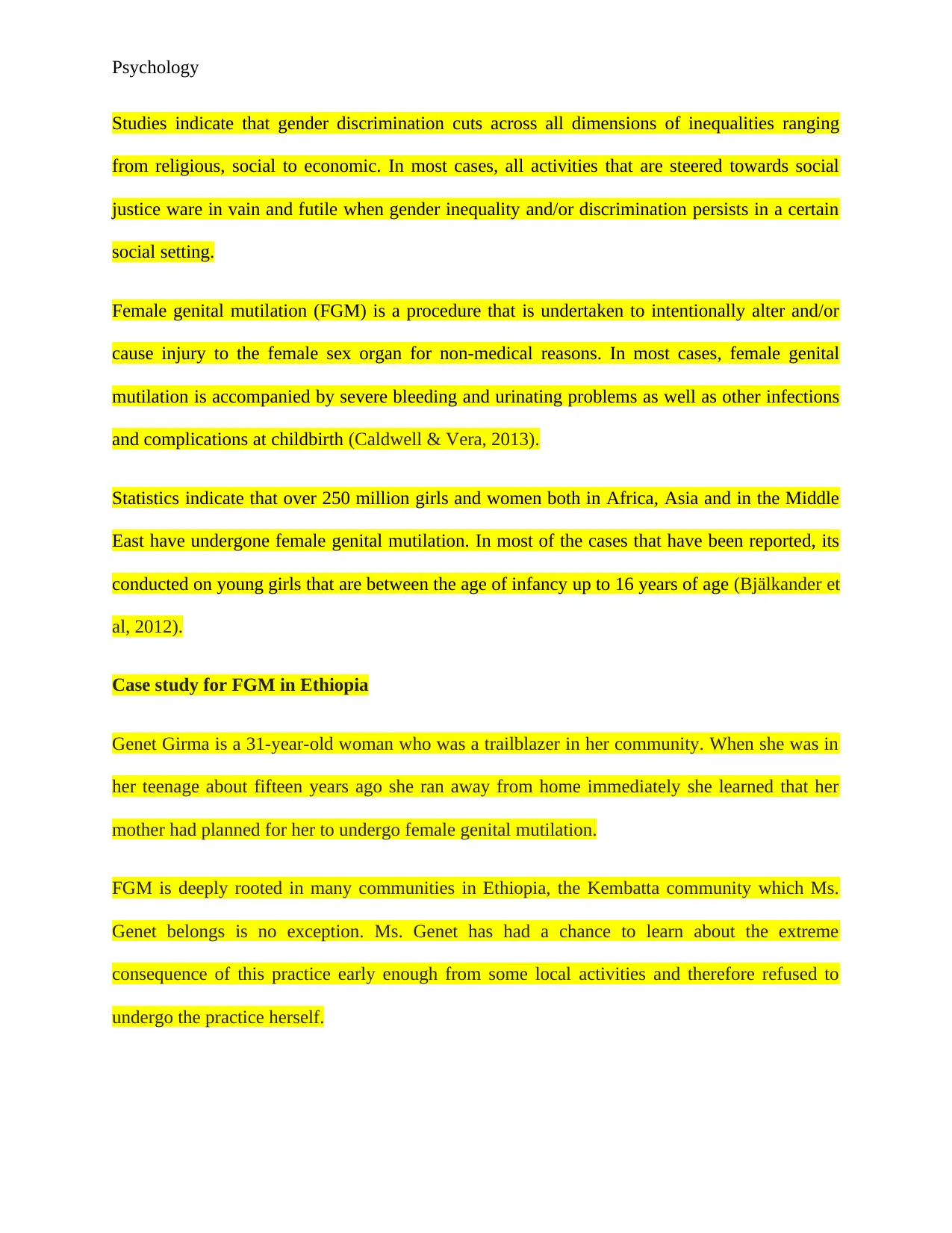
Psychology
Studies indicate that gender discrimination cuts across all dimensions of inequalities ranging
from religious, social to economic. In most cases, all activities that are steered towards social
justice ware in vain and futile when gender inequality and/or discrimination persists in a certain
social setting.
Female genital mutilation (FGM) is a procedure that is undertaken to intentionally alter and/or
cause injury to the female sex organ for non-medical reasons. In most cases, female genital
mutilation is accompanied by severe bleeding and urinating problems as well as other infections
and complications at childbirth (Caldwell & Vera, 2013).
Statistics indicate that over 250 million girls and women both in Africa, Asia and in the Middle
East have undergone female genital mutilation. In most of the cases that have been reported, its
conducted on young girls that are between the age of infancy up to 16 years of age (Bjälkander et
al, 2012).
Case study for FGM in Ethiopia
Genet Girma is a 31-year-old woman who was a trailblazer in her community. When she was in
her teenage about fifteen years ago she ran away from home immediately she learned that her
mother had planned for her to undergo female genital mutilation.
FGM is deeply rooted in many communities in Ethiopia, the Kembatta community which Ms.
Genet belongs is no exception. Ms. Genet has had a chance to learn about the extreme
consequence of this practice early enough from some local activities and therefore refused to
undergo the practice herself.
Studies indicate that gender discrimination cuts across all dimensions of inequalities ranging
from religious, social to economic. In most cases, all activities that are steered towards social
justice ware in vain and futile when gender inequality and/or discrimination persists in a certain
social setting.
Female genital mutilation (FGM) is a procedure that is undertaken to intentionally alter and/or
cause injury to the female sex organ for non-medical reasons. In most cases, female genital
mutilation is accompanied by severe bleeding and urinating problems as well as other infections
and complications at childbirth (Caldwell & Vera, 2013).
Statistics indicate that over 250 million girls and women both in Africa, Asia and in the Middle
East have undergone female genital mutilation. In most of the cases that have been reported, its
conducted on young girls that are between the age of infancy up to 16 years of age (Bjälkander et
al, 2012).
Case study for FGM in Ethiopia
Genet Girma is a 31-year-old woman who was a trailblazer in her community. When she was in
her teenage about fifteen years ago she ran away from home immediately she learned that her
mother had planned for her to undergo female genital mutilation.
FGM is deeply rooted in many communities in Ethiopia, the Kembatta community which Ms.
Genet belongs is no exception. Ms. Genet has had a chance to learn about the extreme
consequence of this practice early enough from some local activities and therefore refused to
undergo the practice herself.
Paraphrase This Document
Need a fresh take? Get an instant paraphrase of this document with our AI Paraphraser
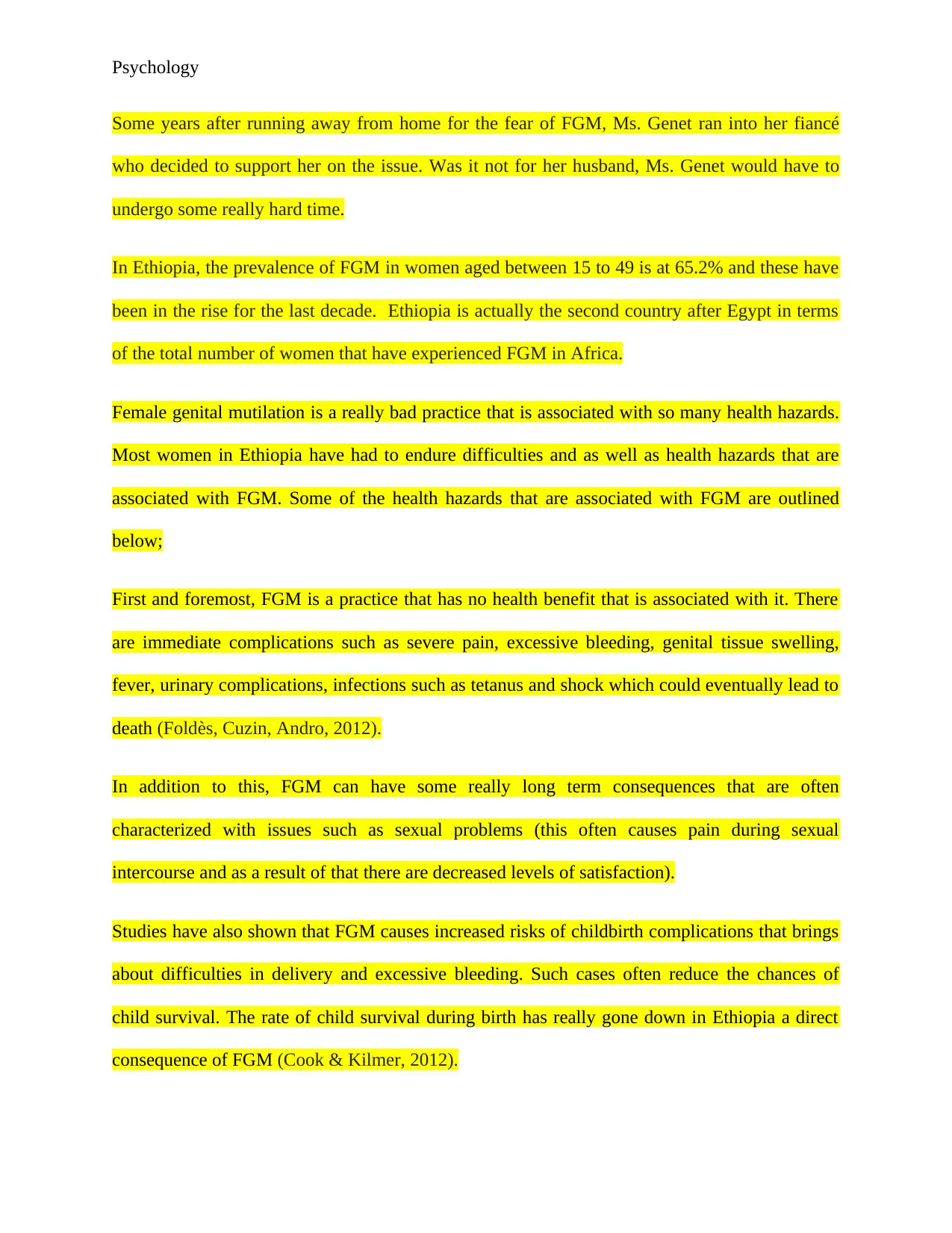
Psychology
Some years after running away from home for the fear of FGM, Ms. Genet ran into her fiancé
who decided to support her on the issue. Was it not for her husband, Ms. Genet would have to
undergo some really hard time.
In Ethiopia, the prevalence of FGM in women aged between 15 to 49 is at 65.2% and these have
been in the rise for the last decade. Ethiopia is actually the second country after Egypt in terms
of the total number of women that have experienced FGM in Africa.
Female genital mutilation is a really bad practice that is associated with so many health hazards.
Most women in Ethiopia have had to endure difficulties and as well as health hazards that are
associated with FGM. Some of the health hazards that are associated with FGM are outlined
below;
First and foremost, FGM is a practice that has no health benefit that is associated with it. There
are immediate complications such as severe pain, excessive bleeding, genital tissue swelling,
fever, urinary complications, infections such as tetanus and shock which could eventually lead to
death (Foldès, Cuzin, Andro, 2012).
In addition to this, FGM can have some really long term consequences that are often
characterized with issues such as sexual problems (this often causes pain during sexual
intercourse and as a result of that there are decreased levels of satisfaction).
Studies have also shown that FGM causes increased risks of childbirth complications that brings
about difficulties in delivery and excessive bleeding. Such cases often reduce the chances of
child survival. The rate of child survival during birth has really gone down in Ethiopia a direct
consequence of FGM (Cook & Kilmer, 2012).
Some years after running away from home for the fear of FGM, Ms. Genet ran into her fiancé
who decided to support her on the issue. Was it not for her husband, Ms. Genet would have to
undergo some really hard time.
In Ethiopia, the prevalence of FGM in women aged between 15 to 49 is at 65.2% and these have
been in the rise for the last decade. Ethiopia is actually the second country after Egypt in terms
of the total number of women that have experienced FGM in Africa.
Female genital mutilation is a really bad practice that is associated with so many health hazards.
Most women in Ethiopia have had to endure difficulties and as well as health hazards that are
associated with FGM. Some of the health hazards that are associated with FGM are outlined
below;
First and foremost, FGM is a practice that has no health benefit that is associated with it. There
are immediate complications such as severe pain, excessive bleeding, genital tissue swelling,
fever, urinary complications, infections such as tetanus and shock which could eventually lead to
death (Foldès, Cuzin, Andro, 2012).
In addition to this, FGM can have some really long term consequences that are often
characterized with issues such as sexual problems (this often causes pain during sexual
intercourse and as a result of that there are decreased levels of satisfaction).
Studies have also shown that FGM causes increased risks of childbirth complications that brings
about difficulties in delivery and excessive bleeding. Such cases often reduce the chances of
child survival. The rate of child survival during birth has really gone down in Ethiopia a direct
consequence of FGM (Cook & Kilmer, 2012).
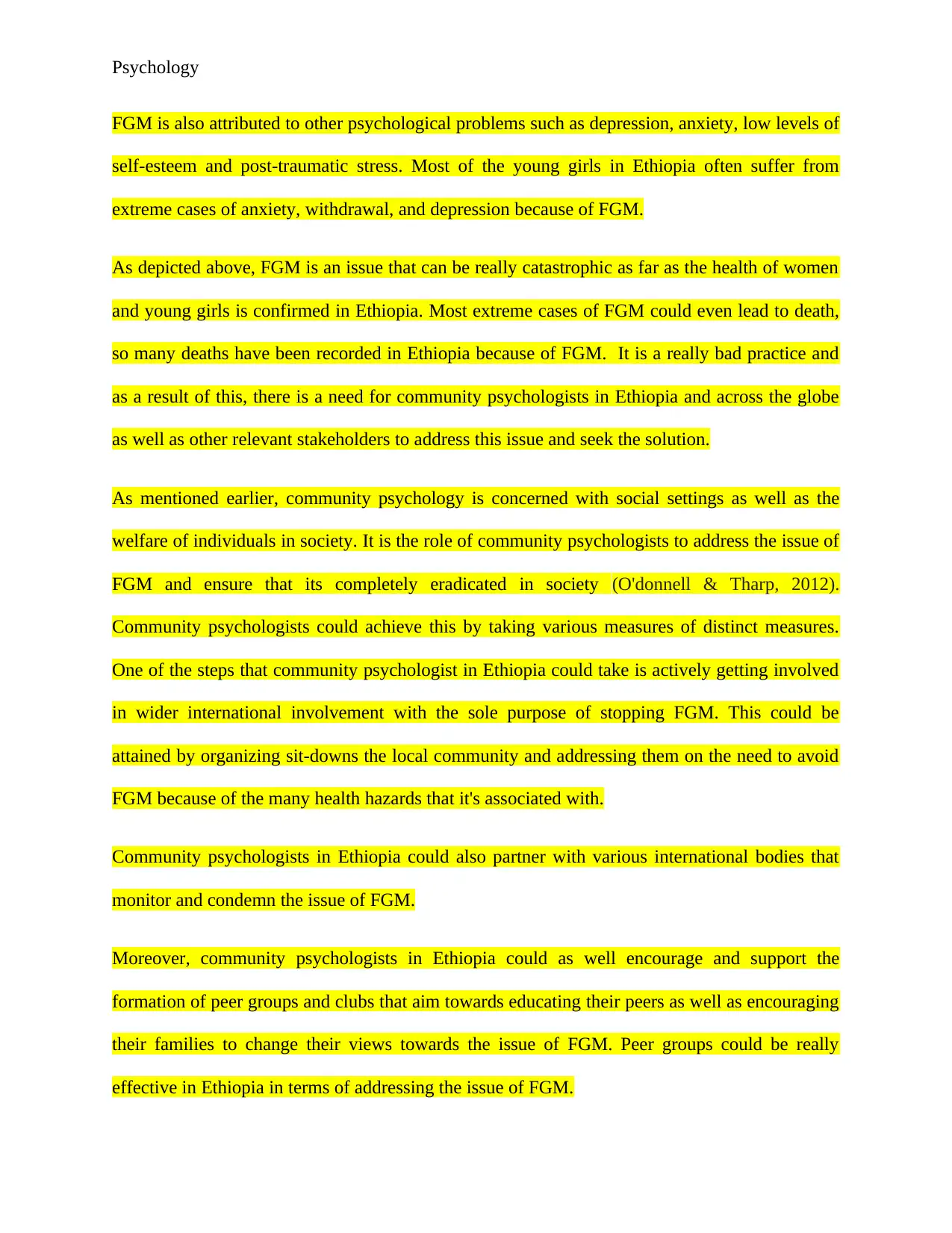
Psychology
FGM is also attributed to other psychological problems such as depression, anxiety, low levels of
self-esteem and post-traumatic stress. Most of the young girls in Ethiopia often suffer from
extreme cases of anxiety, withdrawal, and depression because of FGM.
As depicted above, FGM is an issue that can be really catastrophic as far as the health of women
and young girls is confirmed in Ethiopia. Most extreme cases of FGM could even lead to death,
so many deaths have been recorded in Ethiopia because of FGM. It is a really bad practice and
as a result of this, there is a need for community psychologists in Ethiopia and across the globe
as well as other relevant stakeholders to address this issue and seek the solution.
As mentioned earlier, community psychology is concerned with social settings as well as the
welfare of individuals in society. It is the role of community psychologists to address the issue of
FGM and ensure that its completely eradicated in society (O'donnell & Tharp, 2012).
Community psychologists could achieve this by taking various measures of distinct measures.
One of the steps that community psychologist in Ethiopia could take is actively getting involved
in wider international involvement with the sole purpose of stopping FGM. This could be
attained by organizing sit-downs the local community and addressing them on the need to avoid
FGM because of the many health hazards that it's associated with.
Community psychologists in Ethiopia could also partner with various international bodies that
monitor and condemn the issue of FGM.
Moreover, community psychologists in Ethiopia could as well encourage and support the
formation of peer groups and clubs that aim towards educating their peers as well as encouraging
their families to change their views towards the issue of FGM. Peer groups could be really
effective in Ethiopia in terms of addressing the issue of FGM.
FGM is also attributed to other psychological problems such as depression, anxiety, low levels of
self-esteem and post-traumatic stress. Most of the young girls in Ethiopia often suffer from
extreme cases of anxiety, withdrawal, and depression because of FGM.
As depicted above, FGM is an issue that can be really catastrophic as far as the health of women
and young girls is confirmed in Ethiopia. Most extreme cases of FGM could even lead to death,
so many deaths have been recorded in Ethiopia because of FGM. It is a really bad practice and
as a result of this, there is a need for community psychologists in Ethiopia and across the globe
as well as other relevant stakeholders to address this issue and seek the solution.
As mentioned earlier, community psychology is concerned with social settings as well as the
welfare of individuals in society. It is the role of community psychologists to address the issue of
FGM and ensure that its completely eradicated in society (O'donnell & Tharp, 2012).
Community psychologists could achieve this by taking various measures of distinct measures.
One of the steps that community psychologist in Ethiopia could take is actively getting involved
in wider international involvement with the sole purpose of stopping FGM. This could be
attained by organizing sit-downs the local community and addressing them on the need to avoid
FGM because of the many health hazards that it's associated with.
Community psychologists in Ethiopia could also partner with various international bodies that
monitor and condemn the issue of FGM.
Moreover, community psychologists in Ethiopia could as well encourage and support the
formation of peer groups and clubs that aim towards educating their peers as well as encouraging
their families to change their views towards the issue of FGM. Peer groups could be really
effective in Ethiopia in terms of addressing the issue of FGM.
⊘ This is a preview!⊘
Do you want full access?
Subscribe today to unlock all pages.

Trusted by 1+ million students worldwide
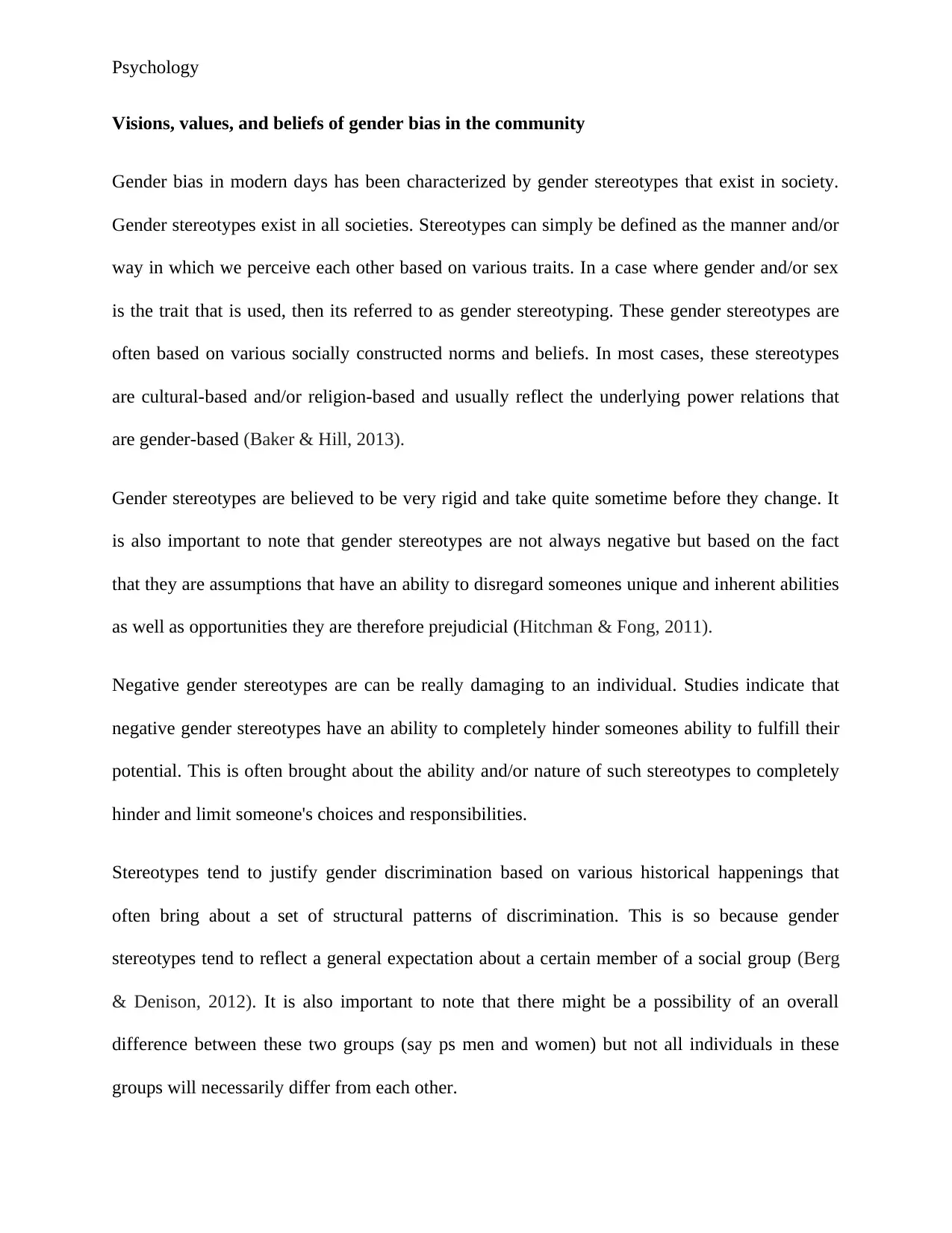
Psychology
Visions, values, and beliefs of gender bias in the community
Gender bias in modern days has been characterized by gender stereotypes that exist in society.
Gender stereotypes exist in all societies. Stereotypes can simply be defined as the manner and/or
way in which we perceive each other based on various traits. In a case where gender and/or sex
is the trait that is used, then its referred to as gender stereotyping. These gender stereotypes are
often based on various socially constructed norms and beliefs. In most cases, these stereotypes
are cultural-based and/or religion-based and usually reflect the underlying power relations that
are gender-based (Baker & Hill, 2013).
Gender stereotypes are believed to be very rigid and take quite sometime before they change. It
is also important to note that gender stereotypes are not always negative but based on the fact
that they are assumptions that have an ability to disregard someones unique and inherent abilities
as well as opportunities they are therefore prejudicial (Hitchman & Fong, 2011).
Negative gender stereotypes are can be really damaging to an individual. Studies indicate that
negative gender stereotypes have an ability to completely hinder someones ability to fulfill their
potential. This is often brought about the ability and/or nature of such stereotypes to completely
hinder and limit someone's choices and responsibilities.
Stereotypes tend to justify gender discrimination based on various historical happenings that
often bring about a set of structural patterns of discrimination. This is so because gender
stereotypes tend to reflect a general expectation about a certain member of a social group (Berg
& Denison, 2012). It is also important to note that there might be a possibility of an overall
difference between these two groups (say ps men and women) but not all individuals in these
groups will necessarily differ from each other.
Visions, values, and beliefs of gender bias in the community
Gender bias in modern days has been characterized by gender stereotypes that exist in society.
Gender stereotypes exist in all societies. Stereotypes can simply be defined as the manner and/or
way in which we perceive each other based on various traits. In a case where gender and/or sex
is the trait that is used, then its referred to as gender stereotyping. These gender stereotypes are
often based on various socially constructed norms and beliefs. In most cases, these stereotypes
are cultural-based and/or religion-based and usually reflect the underlying power relations that
are gender-based (Baker & Hill, 2013).
Gender stereotypes are believed to be very rigid and take quite sometime before they change. It
is also important to note that gender stereotypes are not always negative but based on the fact
that they are assumptions that have an ability to disregard someones unique and inherent abilities
as well as opportunities they are therefore prejudicial (Hitchman & Fong, 2011).
Negative gender stereotypes are can be really damaging to an individual. Studies indicate that
negative gender stereotypes have an ability to completely hinder someones ability to fulfill their
potential. This is often brought about the ability and/or nature of such stereotypes to completely
hinder and limit someone's choices and responsibilities.
Stereotypes tend to justify gender discrimination based on various historical happenings that
often bring about a set of structural patterns of discrimination. This is so because gender
stereotypes tend to reflect a general expectation about a certain member of a social group (Berg
& Denison, 2012). It is also important to note that there might be a possibility of an overall
difference between these two groups (say ps men and women) but not all individuals in these
groups will necessarily differ from each other.
Paraphrase This Document
Need a fresh take? Get an instant paraphrase of this document with our AI Paraphraser
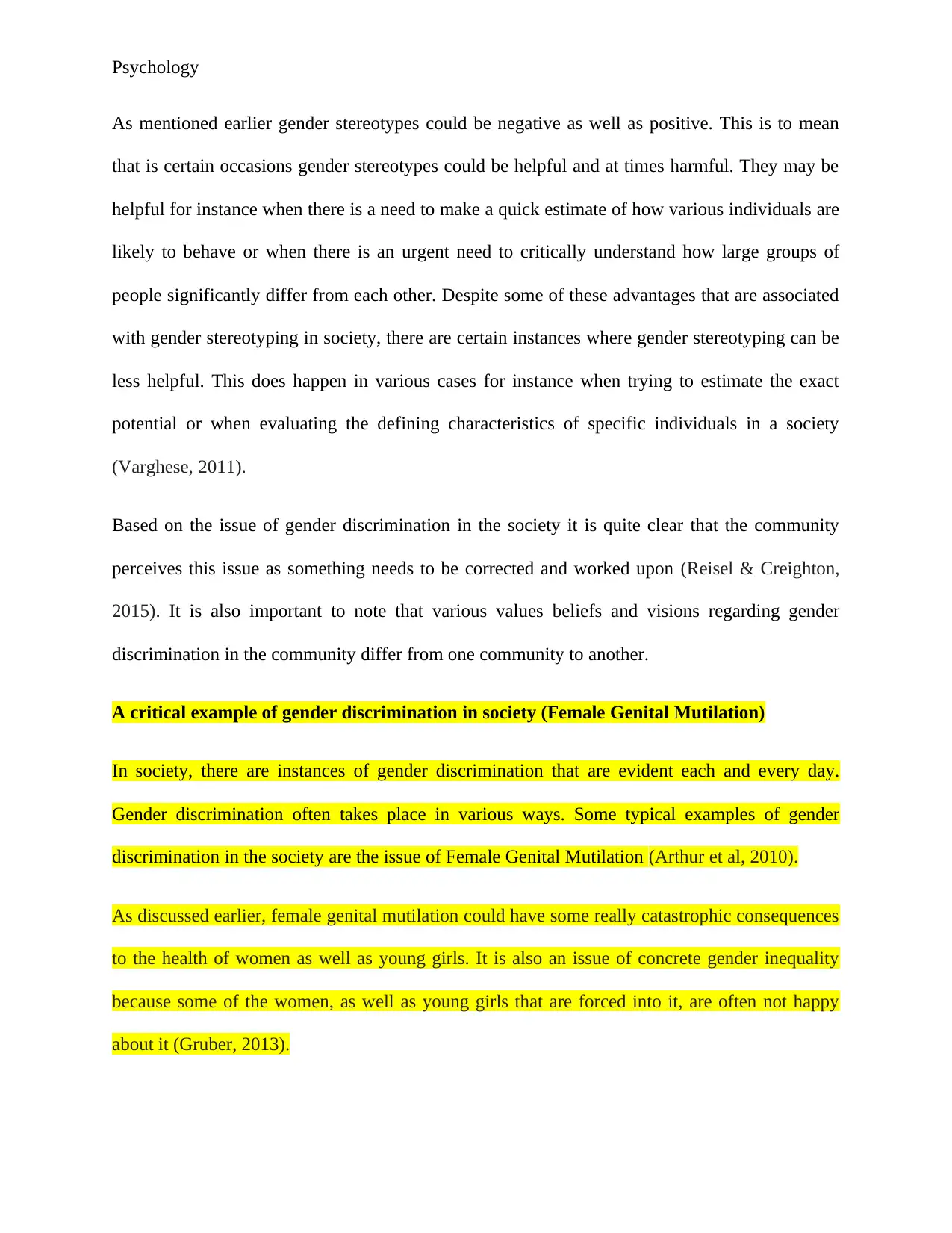
Psychology
As mentioned earlier gender stereotypes could be negative as well as positive. This is to mean
that is certain occasions gender stereotypes could be helpful and at times harmful. They may be
helpful for instance when there is a need to make a quick estimate of how various individuals are
likely to behave or when there is an urgent need to critically understand how large groups of
people significantly differ from each other. Despite some of these advantages that are associated
with gender stereotyping in society, there are certain instances where gender stereotyping can be
less helpful. This does happen in various cases for instance when trying to estimate the exact
potential or when evaluating the defining characteristics of specific individuals in a society
(Varghese, 2011).
Based on the issue of gender discrimination in the society it is quite clear that the community
perceives this issue as something needs to be corrected and worked upon (Reisel & Creighton,
2015). It is also important to note that various values beliefs and visions regarding gender
discrimination in the community differ from one community to another.
A critical example of gender discrimination in society (Female Genital Mutilation)
In society, there are instances of gender discrimination that are evident each and every day.
Gender discrimination often takes place in various ways. Some typical examples of gender
discrimination in the society are the issue of Female Genital Mutilation (Arthur et al, 2010).
As discussed earlier, female genital mutilation could have some really catastrophic consequences
to the health of women as well as young girls. It is also an issue of concrete gender inequality
because some of the women, as well as young girls that are forced into it, are often not happy
about it (Gruber, 2013).
As mentioned earlier gender stereotypes could be negative as well as positive. This is to mean
that is certain occasions gender stereotypes could be helpful and at times harmful. They may be
helpful for instance when there is a need to make a quick estimate of how various individuals are
likely to behave or when there is an urgent need to critically understand how large groups of
people significantly differ from each other. Despite some of these advantages that are associated
with gender stereotyping in society, there are certain instances where gender stereotyping can be
less helpful. This does happen in various cases for instance when trying to estimate the exact
potential or when evaluating the defining characteristics of specific individuals in a society
(Varghese, 2011).
Based on the issue of gender discrimination in the society it is quite clear that the community
perceives this issue as something needs to be corrected and worked upon (Reisel & Creighton,
2015). It is also important to note that various values beliefs and visions regarding gender
discrimination in the community differ from one community to another.
A critical example of gender discrimination in society (Female Genital Mutilation)
In society, there are instances of gender discrimination that are evident each and every day.
Gender discrimination often takes place in various ways. Some typical examples of gender
discrimination in the society are the issue of Female Genital Mutilation (Arthur et al, 2010).
As discussed earlier, female genital mutilation could have some really catastrophic consequences
to the health of women as well as young girls. It is also an issue of concrete gender inequality
because some of the women, as well as young girls that are forced into it, are often not happy
about it (Gruber, 2013).
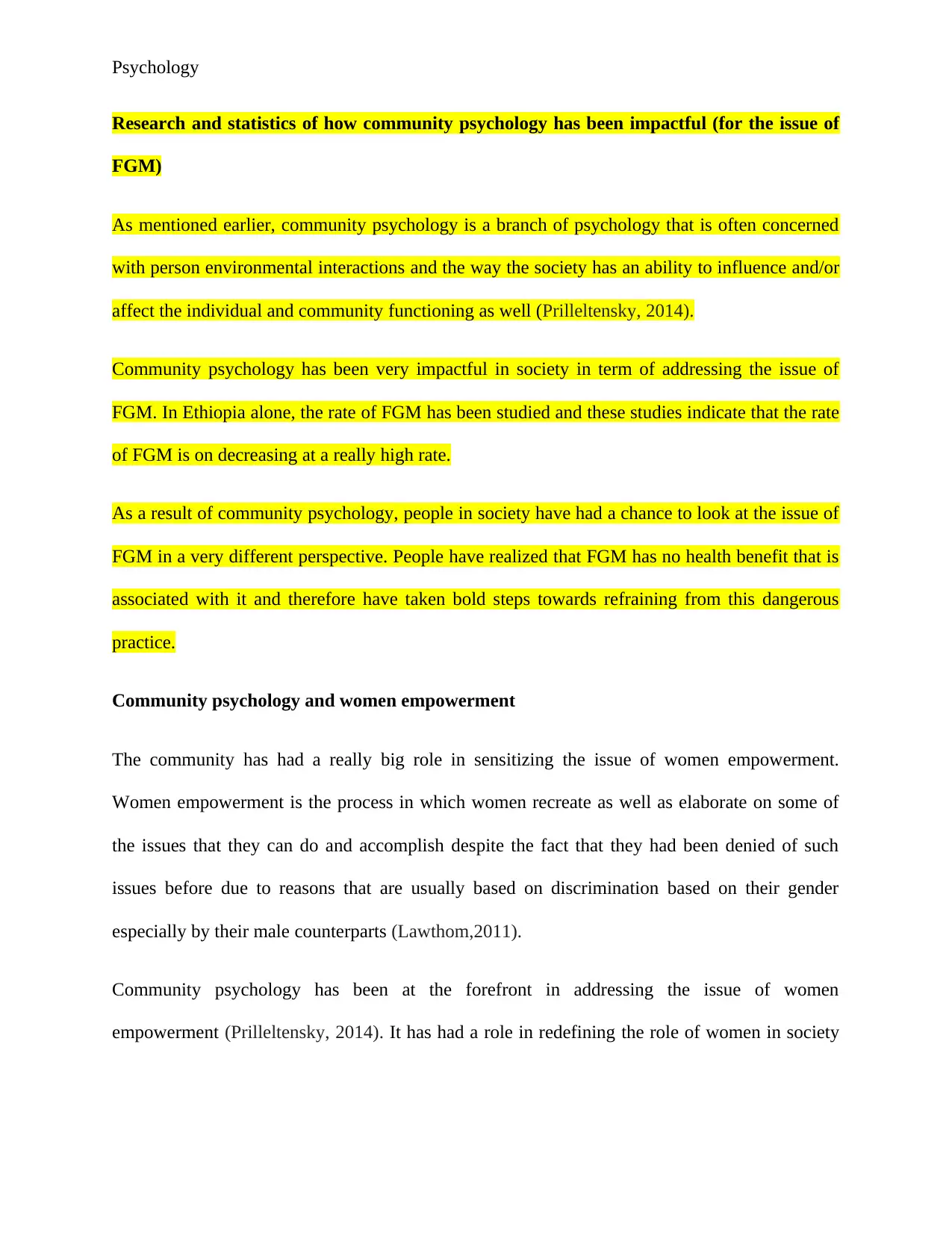
Psychology
Research and statistics of how community psychology has been impactful (for the issue of
FGM)
As mentioned earlier, community psychology is a branch of psychology that is often concerned
with person environmental interactions and the way the society has an ability to influence and/or
affect the individual and community functioning as well (Prilleltensky, 2014).
Community psychology has been very impactful in society in term of addressing the issue of
FGM. In Ethiopia alone, the rate of FGM has been studied and these studies indicate that the rate
of FGM is on decreasing at a really high rate.
As a result of community psychology, people in society have had a chance to look at the issue of
FGM in a very different perspective. People have realized that FGM has no health benefit that is
associated with it and therefore have taken bold steps towards refraining from this dangerous
practice.
Community psychology and women empowerment
The community has had a really big role in sensitizing the issue of women empowerment.
Women empowerment is the process in which women recreate as well as elaborate on some of
the issues that they can do and accomplish despite the fact that they had been denied of such
issues before due to reasons that are usually based on discrimination based on their gender
especially by their male counterparts (Lawthom,2011).
Community psychology has been at the forefront in addressing the issue of women
empowerment (Prilleltensky, 2014). It has had a role in redefining the role of women in society
Research and statistics of how community psychology has been impactful (for the issue of
FGM)
As mentioned earlier, community psychology is a branch of psychology that is often concerned
with person environmental interactions and the way the society has an ability to influence and/or
affect the individual and community functioning as well (Prilleltensky, 2014).
Community psychology has been very impactful in society in term of addressing the issue of
FGM. In Ethiopia alone, the rate of FGM has been studied and these studies indicate that the rate
of FGM is on decreasing at a really high rate.
As a result of community psychology, people in society have had a chance to look at the issue of
FGM in a very different perspective. People have realized that FGM has no health benefit that is
associated with it and therefore have taken bold steps towards refraining from this dangerous
practice.
Community psychology and women empowerment
The community has had a really big role in sensitizing the issue of women empowerment.
Women empowerment is the process in which women recreate as well as elaborate on some of
the issues that they can do and accomplish despite the fact that they had been denied of such
issues before due to reasons that are usually based on discrimination based on their gender
especially by their male counterparts (Lawthom,2011).
Community psychology has been at the forefront in addressing the issue of women
empowerment (Prilleltensky, 2014). It has had a role in redefining the role of women in society
⊘ This is a preview!⊘
Do you want full access?
Subscribe today to unlock all pages.

Trusted by 1+ million students worldwide
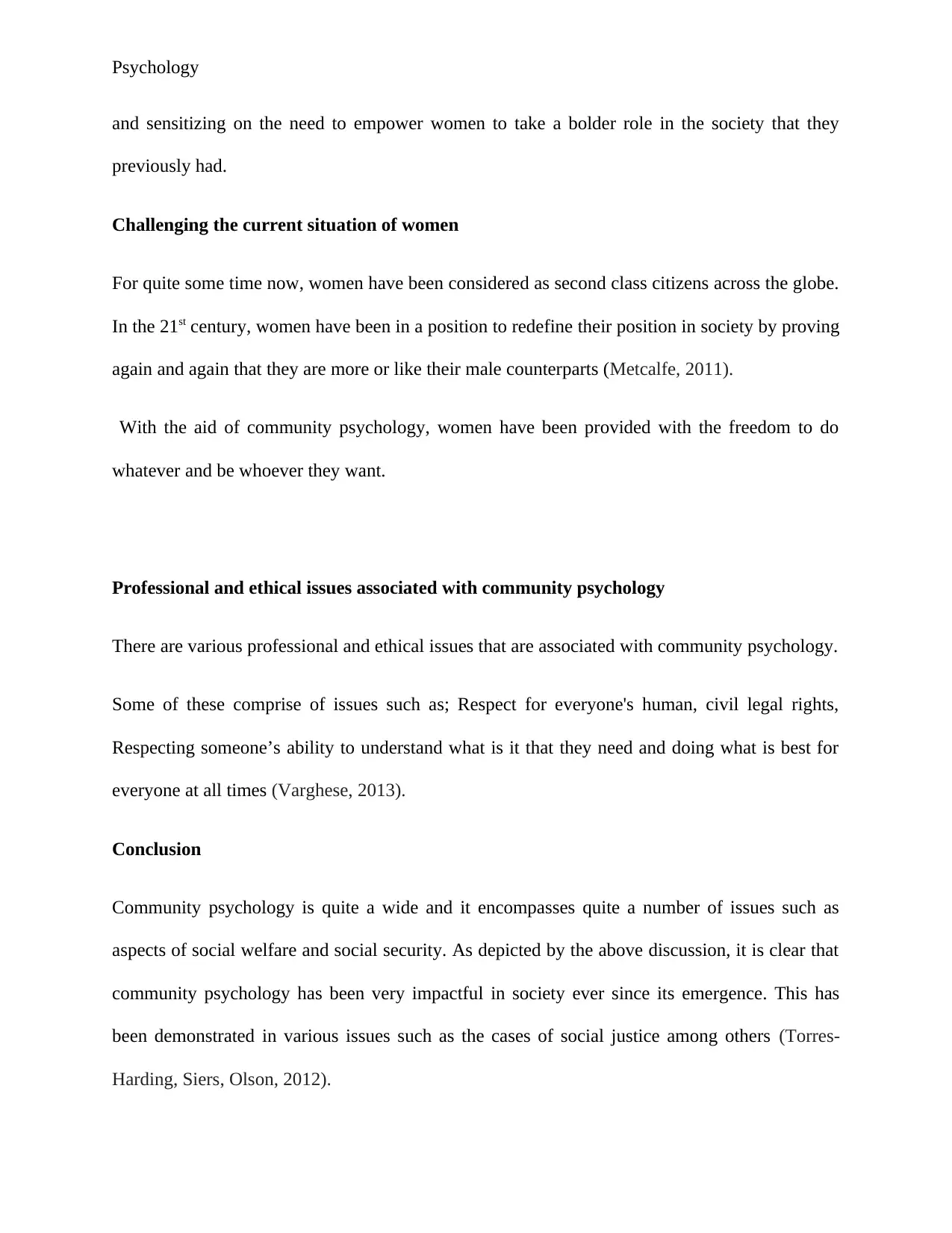
Psychology
and sensitizing on the need to empower women to take a bolder role in the society that they
previously had.
Challenging the current situation of women
For quite some time now, women have been considered as second class citizens across the globe.
In the 21st century, women have been in a position to redefine their position in society by proving
again and again that they are more or like their male counterparts (Metcalfe, 2011).
With the aid of community psychology, women have been provided with the freedom to do
whatever and be whoever they want.
Professional and ethical issues associated with community psychology
There are various professional and ethical issues that are associated with community psychology.
Some of these comprise of issues such as; Respect for everyone's human, civil legal rights,
Respecting someone’s ability to understand what is it that they need and doing what is best for
everyone at all times (Varghese, 2013).
Conclusion
Community psychology is quite a wide and it encompasses quite a number of issues such as
aspects of social welfare and social security. As depicted by the above discussion, it is clear that
community psychology has been very impactful in society ever since its emergence. This has
been demonstrated in various issues such as the cases of social justice among others (Torres-
Harding, Siers, Olson, 2012).
and sensitizing on the need to empower women to take a bolder role in the society that they
previously had.
Challenging the current situation of women
For quite some time now, women have been considered as second class citizens across the globe.
In the 21st century, women have been in a position to redefine their position in society by proving
again and again that they are more or like their male counterparts (Metcalfe, 2011).
With the aid of community psychology, women have been provided with the freedom to do
whatever and be whoever they want.
Professional and ethical issues associated with community psychology
There are various professional and ethical issues that are associated with community psychology.
Some of these comprise of issues such as; Respect for everyone's human, civil legal rights,
Respecting someone’s ability to understand what is it that they need and doing what is best for
everyone at all times (Varghese, 2013).
Conclusion
Community psychology is quite a wide and it encompasses quite a number of issues such as
aspects of social welfare and social security. As depicted by the above discussion, it is clear that
community psychology has been very impactful in society ever since its emergence. This has
been demonstrated in various issues such as the cases of social justice among others (Torres-
Harding, Siers, Olson, 2012).
Paraphrase This Document
Need a fresh take? Get an instant paraphrase of this document with our AI Paraphraser
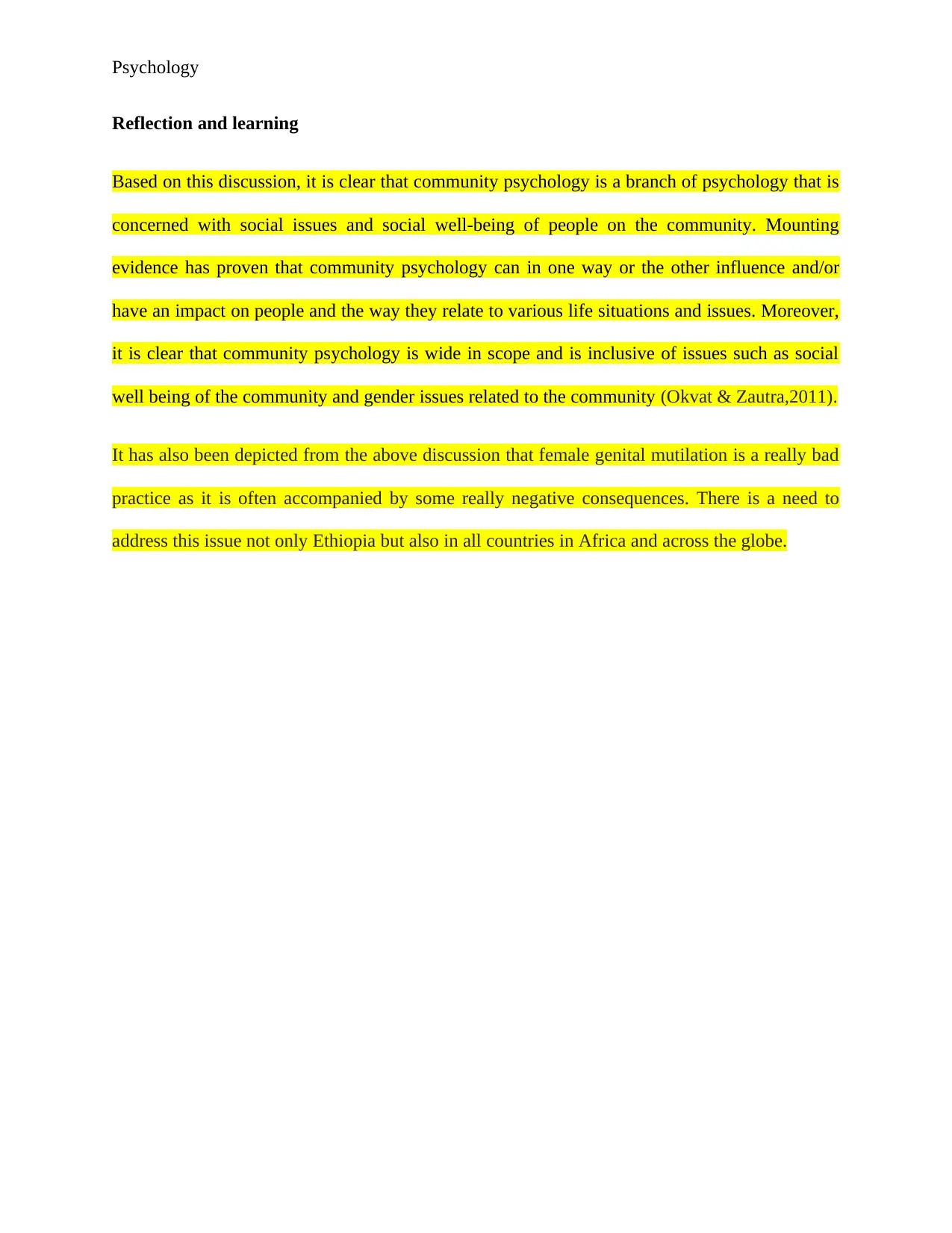
Psychology
Reflection and learning
Based on this discussion, it is clear that community psychology is a branch of psychology that is
concerned with social issues and social well-being of people on the community. Mounting
evidence has proven that community psychology can in one way or the other influence and/or
have an impact on people and the way they relate to various life situations and issues. Moreover,
it is clear that community psychology is wide in scope and is inclusive of issues such as social
well being of the community and gender issues related to the community (Okvat & Zautra,2011).
It has also been depicted from the above discussion that female genital mutilation is a really bad
practice as it is often accompanied by some really negative consequences. There is a need to
address this issue not only Ethiopia but also in all countries in Africa and across the globe.
Reflection and learning
Based on this discussion, it is clear that community psychology is a branch of psychology that is
concerned with social issues and social well-being of people on the community. Mounting
evidence has proven that community psychology can in one way or the other influence and/or
have an impact on people and the way they relate to various life situations and issues. Moreover,
it is clear that community psychology is wide in scope and is inclusive of issues such as social
well being of the community and gender issues related to the community (Okvat & Zautra,2011).
It has also been depicted from the above discussion that female genital mutilation is a really bad
practice as it is often accompanied by some really negative consequences. There is a need to
address this issue not only Ethiopia but also in all countries in Africa and across the globe.
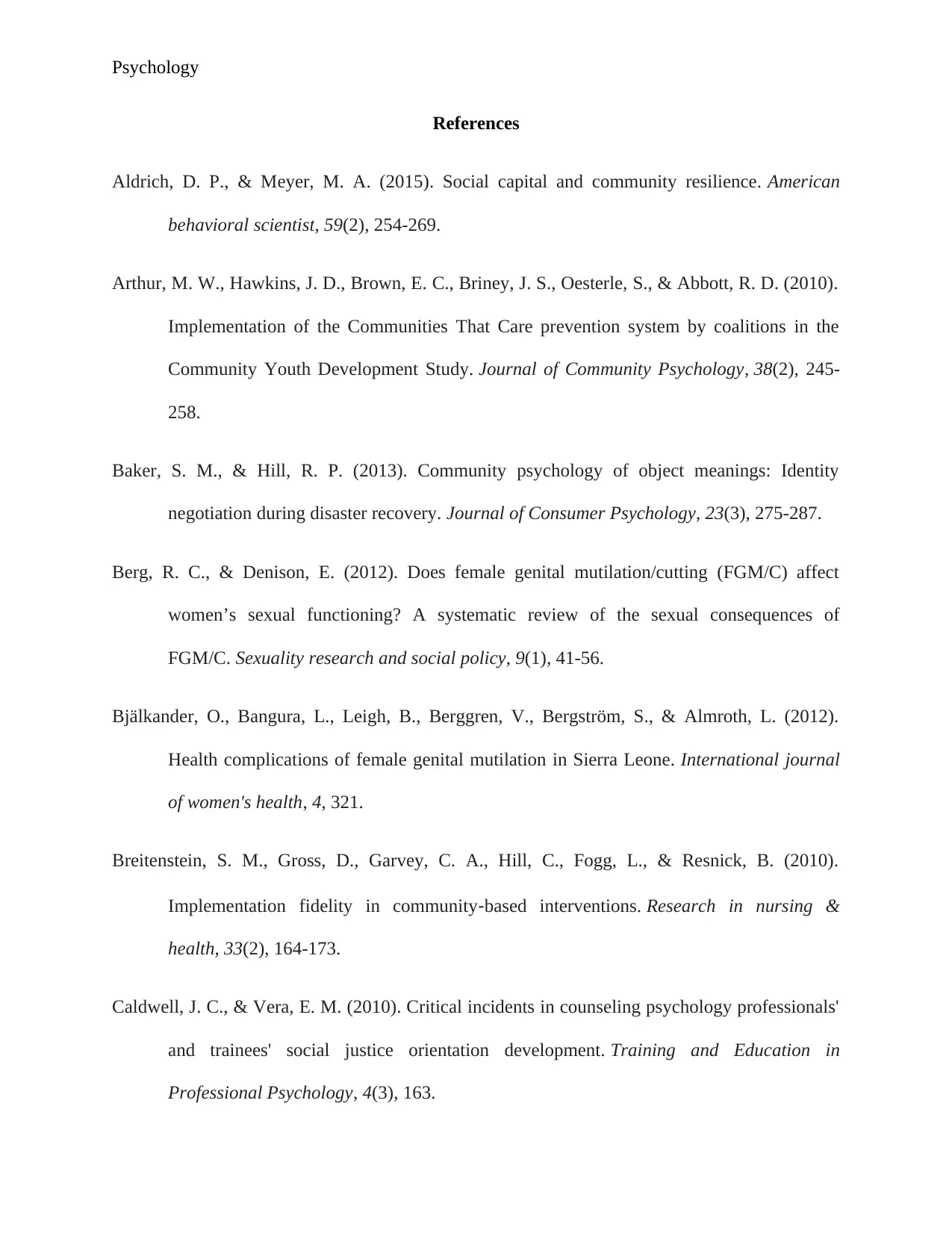
Psychology
References
Aldrich, D. P., & Meyer, M. A. (2015). Social capital and community resilience. American
behavioral scientist, 59(2), 254-269.
Arthur, M. W., Hawkins, J. D., Brown, E. C., Briney, J. S., Oesterle, S., & Abbott, R. D. (2010).
Implementation of the Communities That Care prevention system by coalitions in the
Community Youth Development Study. Journal of Community Psychology, 38(2), 245-
258.
Baker, S. M., & Hill, R. P. (2013). Community psychology of object meanings: Identity
negotiation during disaster recovery. Journal of Consumer Psychology, 23(3), 275-287.
Berg, R. C., & Denison, E. (2012). Does female genital mutilation/cutting (FGM/C) affect
women’s sexual functioning? A systematic review of the sexual consequences of
FGM/C. Sexuality research and social policy, 9(1), 41-56.
Bjälkander, O., Bangura, L., Leigh, B., Berggren, V., Bergström, S., & Almroth, L. (2012).
Health complications of female genital mutilation in Sierra Leone. International journal
of women's health, 4, 321.
Breitenstein, S. M., Gross, D., Garvey, C. A., Hill, C., Fogg, L., & Resnick, B. (2010).
Implementation fidelity in community‐based interventions. Research in nursing &
health, 33(2), 164-173.
Caldwell, J. C., & Vera, E. M. (2010). Critical incidents in counseling psychology professionals'
and trainees' social justice orientation development. Training and Education in
Professional Psychology, 4(3), 163.
References
Aldrich, D. P., & Meyer, M. A. (2015). Social capital and community resilience. American
behavioral scientist, 59(2), 254-269.
Arthur, M. W., Hawkins, J. D., Brown, E. C., Briney, J. S., Oesterle, S., & Abbott, R. D. (2010).
Implementation of the Communities That Care prevention system by coalitions in the
Community Youth Development Study. Journal of Community Psychology, 38(2), 245-
258.
Baker, S. M., & Hill, R. P. (2013). Community psychology of object meanings: Identity
negotiation during disaster recovery. Journal of Consumer Psychology, 23(3), 275-287.
Berg, R. C., & Denison, E. (2012). Does female genital mutilation/cutting (FGM/C) affect
women’s sexual functioning? A systematic review of the sexual consequences of
FGM/C. Sexuality research and social policy, 9(1), 41-56.
Bjälkander, O., Bangura, L., Leigh, B., Berggren, V., Bergström, S., & Almroth, L. (2012).
Health complications of female genital mutilation in Sierra Leone. International journal
of women's health, 4, 321.
Breitenstein, S. M., Gross, D., Garvey, C. A., Hill, C., Fogg, L., & Resnick, B. (2010).
Implementation fidelity in community‐based interventions. Research in nursing &
health, 33(2), 164-173.
Caldwell, J. C., & Vera, E. M. (2010). Critical incidents in counseling psychology professionals'
and trainees' social justice orientation development. Training and Education in
Professional Psychology, 4(3), 163.
⊘ This is a preview!⊘
Do you want full access?
Subscribe today to unlock all pages.

Trusted by 1+ million students worldwide
1 out of 15
Related Documents
Your All-in-One AI-Powered Toolkit for Academic Success.
+13062052269
info@desklib.com
Available 24*7 on WhatsApp / Email
![[object Object]](/_next/static/media/star-bottom.7253800d.svg)
Unlock your academic potential
Copyright © 2020–2025 A2Z Services. All Rights Reserved. Developed and managed by ZUCOL.





